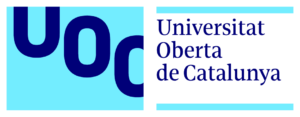An ethnography within the design processes of smart things/smart citizens and their visions of future
The 2nd of May took place Débora Lanzeni’s oral defence at IN3-UOC in Castelldefels, Barcelona. Congrats, a brand-new Phd. at mediaccions!
Her doctoral thesis examines the entanglement of material processes by focusing in the ordinary processes of designing smart technologies in the so-called “Internet of Things” and Smart City project in Europe, analyzing how visions of future and moral values are intermingled in the creation of digital technologies.
 This thesis aims to substantively contribute to the interdisciplinary debate of understanding the place of digital technologies in everyday life and in shaping our digital futures drawing on Anthropology of Design and developing an ethnographic processual approach. She argues that in order to enhance our understanding of the relationship between technology and social change, we need to place the processes of smart technology design at the intersection of the ordinary world of making technology and of their visions of future and the technological possible. To achieve this she has carried out a processual ethnography based on twenty-six months of fieldwork conducted between 2012 and 2015 among smart technologies’ designers, following their activities in online settings and in the cities of Barcelona and London in different spaces (Made and Mob Barcelona, Fablab Barcelona, Hangar, MakerSpace London, etc.), startups and projects (specially Smart Citizen Kit and Air Quality Egg). Furthermore, she has developed an analytical framework using three vectors: visions of future (what is feasible and desirable from technology), the imaginary (images that are used to project the technology into the world) and imagination (as an action in the world). Her ethnographic account shows that there is an articulation between materialization processes, visions of future and moral values, useful to interpret how technologies are imagined and designed beyond the dichotomies of commercial and open technologies. Future as an analytical concept has been crucial to make sense of how processes of designing technology operate, because it allowed her to re-cast the categories of materiality, movement and know-how, in a dialogue between the literature review and what she has learned in the field. Furthermore, this revealed four core outputs of this research: knowledge as crafting, a link between future and materiality beyond its encapsulation in a temporal line, Internet of (no)Things, in the sense that what matter in making smart technologies are not the objects but the open ended projects and, what she calls Maker Anthropology, an anthropology that, in this case, understands knowledge production as an output of the mutual learning with others.
This thesis aims to substantively contribute to the interdisciplinary debate of understanding the place of digital technologies in everyday life and in shaping our digital futures drawing on Anthropology of Design and developing an ethnographic processual approach. She argues that in order to enhance our understanding of the relationship between technology and social change, we need to place the processes of smart technology design at the intersection of the ordinary world of making technology and of their visions of future and the technological possible. To achieve this she has carried out a processual ethnography based on twenty-six months of fieldwork conducted between 2012 and 2015 among smart technologies’ designers, following their activities in online settings and in the cities of Barcelona and London in different spaces (Made and Mob Barcelona, Fablab Barcelona, Hangar, MakerSpace London, etc.), startups and projects (specially Smart Citizen Kit and Air Quality Egg). Furthermore, she has developed an analytical framework using three vectors: visions of future (what is feasible and desirable from technology), the imaginary (images that are used to project the technology into the world) and imagination (as an action in the world). Her ethnographic account shows that there is an articulation between materialization processes, visions of future and moral values, useful to interpret how technologies are imagined and designed beyond the dichotomies of commercial and open technologies. Future as an analytical concept has been crucial to make sense of how processes of designing technology operate, because it allowed her to re-cast the categories of materiality, movement and know-how, in a dialogue between the literature review and what she has learned in the field. Furthermore, this revealed four core outputs of this research: knowledge as crafting, a link between future and materiality beyond its encapsulation in a temporal line, Internet of (no)Things, in the sense that what matter in making smart technologies are not the objects but the open ended projects and, what she calls Maker Anthropology, an anthropology that, in this case, understands knowledge production as an output of the mutual learning with others.
